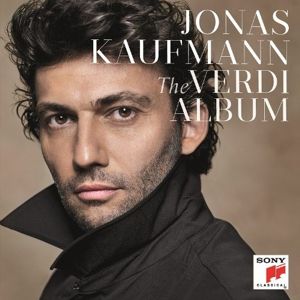 One
keeps searching in vain for flaws in Jonas Kaufmann’s performances—an attack
on a high note that’s slightly under, a shortness of breath, a diminuendo
that fails, a lack of interest in the text, an ugly sound. Nothing. Niente.
Nada. He’s not The Perfect Tenor—nobody ever has been—and his sound, it
might be argued, lacks the brightness and brilliance, the “squillo” (ring)
that is essential to the Italian sound. But it’s close enough. One
keeps searching in vain for flaws in Jonas Kaufmann’s performances—an attack
on a high note that’s slightly under, a shortness of breath, a diminuendo
that fails, a lack of interest in the text, an ugly sound. Nothing. Niente.
Nada. He’s not The Perfect Tenor—nobody ever has been—and his sound, it
might be argued, lacks the brightness and brilliance, the “squillo” (ring)
that is essential to the Italian sound. But it’s close enough.
Judging from the two excerpts from Verdi’s last tragedy, one thing is
certain: Kaufmann is the Otello we have been waiting for. The dark-hued
pillar of sound that is nonetheless clearly that of a tenor, the attention
to detail, the long line, the soft attacks on notes that Verdi marked piano
or pianissimo, and the intelligent reading of the text, even in these two
snippets (“Dio mi potevi” and “Niun mi tema”) assures that there will be
lines around the block when Kaufmann adds the entire opera to his
repertoire. Elsewhere, at the start of the second verse of “Quando le sere
al placido”, he sings with great tenderness and introversion, but pulls out
all the stops for the final outcry.
He doesn’t quite have the
lightness of touch—or tone—to make “La donna e mobile” sound as whimsical as
did Gigli or di Stefano, but he articulates the long, difficult cadenza with
ease and nails the high B-natural at the end. His “Ah, si ben mio” is both
virile and tender, and if his trill isn’t quite a “real” trill, it’s 80
percent closer than almost any other tenor’s in memory (except for Richard
Tucker, whose trill was real). “Di quella pira” (both verses are sung) is a
roof-raiser, and the final high C is sung on both syllables—no vowel
fudging. Alvaro’s “O tu che seno” is delivered with great poetry, the high
A-flat on “seno” is sung “dolce”—many tenors try, few succeed. An excerpt
from “I masnadieri” is thrilling in its full-out, exclamatory delivery.
In “Di tu se fedele” he reins in his big sound, but fans of Björling, et
al, may not be won over despite Kaufmann’s descent to the two bizarrely low
notes in the aria that most tenors take up an octave. And the only thing
I’ll say about the “Celeste Aida” is that it outdoes Jon Vickers’ in
heroics, dreaminess, and in the gorgeous use of dynamics: the final phrase,
taken in one very long breath, ascends to the high B-flat quietly and then
is beautifully, perfectly diminished. And nothing sounds like a gimmick.
Pier Giorgio Morandi leads the Parma Orchestra with distinction and
sensitivity, but the group’s playing is not up to par. Happily, Kaufmann is
what matters here, and he’s spectacular. It’s rare that 70 minutes of music
sung by the same voice doesn’t tire the listener, but Kaufmann is creating
individual characters and is anything but an all-purpose tenor. Bravo!
|